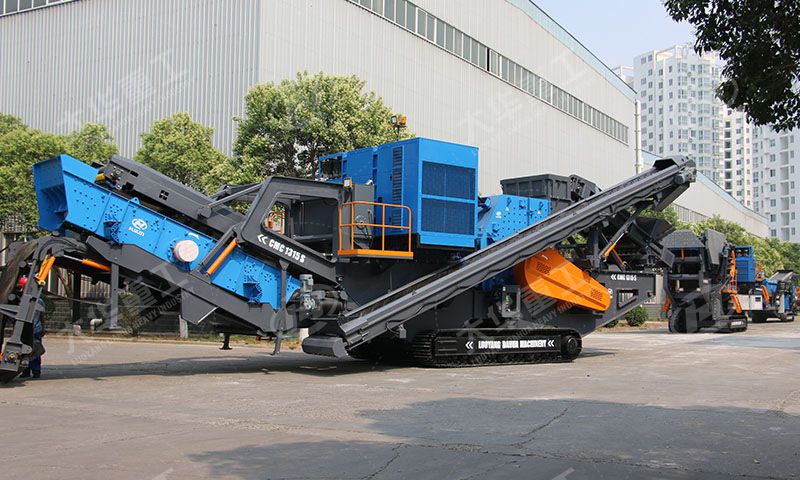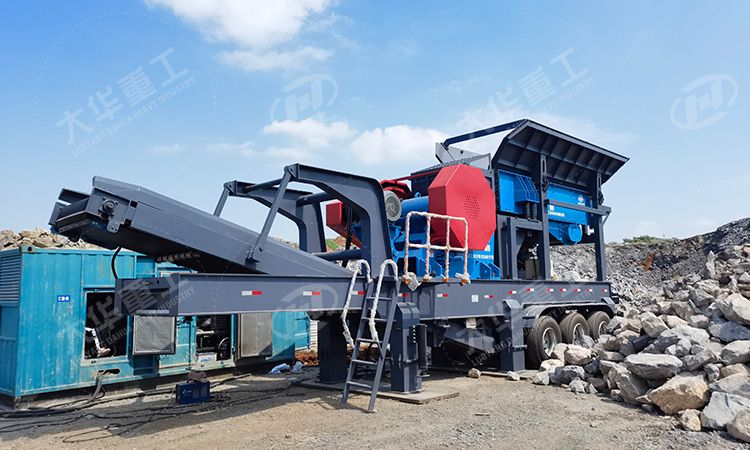Product Knowledge
What are the Advantages of Mobile Crusher Compared with Fixed Crushing Production Line?
author:dahua2 time:2025-08-05
Mobile crushers, essential equipment in modern mining and construction waste disposal, are gradually replacing traditional fixed production lines with their flexibility and efficiency, becoming the new industry favorite. Compared to fixed crushing lines, mobile crushers offer significant advantages in many areas, better meeting diverse production needs. The following will analyze the core advantages of mobile crushers from multiple perspectives.
Flexibility and Convenience
The most prominent advantage of mobile crushers is their high mobility. Traditional fixed crushing lines require ground-based infrastructure construction, including piling and concrete pouring, resulting in lengthy installation cycles and stymied relocation. Mobile crushers, however, utilize tire or track-mounted chassis, allowing for flexible relocation. They are particularly well-suited for applications requiring frequent site changes, such as mining and demolition. For example, in construction waste disposal projects, mobile crushers can be driven directly to the demolition site for on-site crushing and screening, significantly reducing material transportation costs while avoiding the secondary transportation issues associated with fixed production lines due to site constraints.
Furthermore, mobile crushers offer a one-stop operation model, typically integrating feeding, crushing, screening, and conveying functions in one unit, eliminating the need for multiple separate pieces of equipment. This integrated design not only saves space but also simplifies operations, making it particularly suitable for space-constrained urban areas or mountainous areas with complex terrain.
Investment Costs and Economic Benefits
Fixed crushing lines require high initial investment, including land acquisition, plant construction, and equipment installation. Later relocation or expansion costs can further increase these costs. In contrast, mobile crushers offer more flexible initial investment, allowing users to choose between leasing or installment purchases based on production needs, reducing financial pressure. Furthermore, their rapid commissioning (typically requiring only one to two days for commissioning) can shorten the payback period. For example, a sand and gravel plant reduced its startup capital by over 30% after adopting a mobile crusher, eliminating the need for a fixed plant.
In terms of operating costs, mobile crushers reduce fuel consumption and labor costs by shortening material transportation distances. Taking the recycling of construction waste as an example, if waste were transported to a fixed processing plant, the transportation cost would be approximately 15-20 yuan per ton. Using mobile equipment for on-site processing can save this expense, resulting in significant long-term benefits.
Environmental Protection and Energy Saving Performance
Modern mobile crushers are designed with environmental performance in mind. Most models utilize electric or hybrid powertrains, resulting in significantly lower noise and dust emissions than traditional fixed production lines. For example, some high-end models are equipped with pulse dust removal systems and enclosed conveyor belts, which can control dust concentrations to below 10mg/m³, meeting stringent environmental standards. Furthermore, mobile equipment can operate closer to the source of raw materials, reducing the need for heavy truck transportation and thus reducing carbon emissions. Field data from one mining site showed that the use of mobile crushers reduced CO2 emissions from transportation by 45%.
Ability to Adapt to Complex Working Conditions
Stationary crushing lines require high site flatness and load-bearing capacity. However, mobile crushers, with their modular design and adaptable chassis, can operate stably in complex environments, such as mountainous areas and wetlands with slopes of up to 20°. Tracked models can even adapt to soft or rugged terrain, solving the problem of stationary equipment being unable to operate. For example, in a metal mining project in Yunnan, mobile crushers successfully completed primary ore crushing on a steep slope at an altitude of 3,000 meters, whereas traditional fixed production lines had to abandon their operations due to foundation construction difficulties.
Intelligence and Ease of Maintenance
New-generation mobile crushers are generally equipped with remote monitoring systems and intelligent diagnostic functions. Operators can view equipment operating parameters (such as bearing temperature and hydraulic pressure) in real time and receive fault warnings, significantly reducing the risk of downtime. Furthermore, the modular design makes it easier to replace key components (such as the crushing chamber and screens), reducing maintenance time by over 50% compared to fixed production lines.
Comprehensive Resource Utilization Efficiency
For dispersed resources such as construction waste and tailings, mobile crushers can achieve a "decentralized processing, centralized utilization" model. For example, in urban renewal projects, mobile equipment can roam around various demolition sites, crushing waste concrete into recycled aggregate for direct use in new construction site roadbed filling. This model increases resource utilization to over 90%, while fixed production lines typically only achieve a utilization rate of around 70% due to transportation losses.
Conclusion
Overall, mobile crushers outperform fixed crushing production lines in terms of flexibility, cost control, environmental compliance, and adaptability. With technological advancements and increasing environmental protection requirements, their application will further expand, becoming the mainstream choice in resource processing. Of course, users will also need to choose a different model, such as a tire-mo unted or crawler-mounted crusher, based on their specific production scale, raw material characteristics, and other conditions to maximize the technical advantages of mobile crushers. In the future, with the widespread adoption of technologies such as 5G remote control and new energy power, mobile crushers will see even greater development potential.
Previous Article:No Information
Next Article: What Type of Crusher is Used for Metal Ore Crushing Line?








